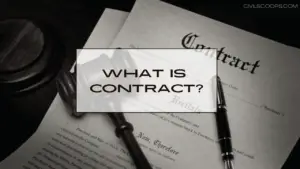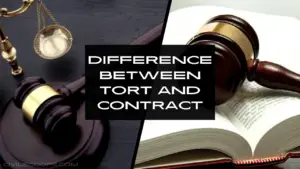All About of Tort and Contract | What is tort | What Is Contract | Difference between Tort and Contract | Tort law definiti on

Table of Contents
What Is Tort?

The word reference’s meaning of the word tort is any wrongful act that leads to legal liability. It likewise implies an act that encroaches on one’s privileges other than when it’s under a contract.
Per common legal jurisdictions, a tort is viewed as common bad behaviour that is required to or accepted to have caused the inquirer mischief or misfortune. Eventually, the act brings about legal liabilities evened out against the miscreant.
What Is Contract ?

The term contract is utilized to allude to a promise or a bunch of the very that can be implemented legally if any of the gatherings included disregards them. The promises are enforceable if the harmed or influenced party is permitted to get to legal cures.
The Anglo-American common law gives that a contract can be entered if there exists an offer, acknowledgment of the offer, contemplations, just as shared arrangements for each gathering to be limited by the contract.
With respect to the contract law, it is basically applied to perceive and oversee the rights just as obligations that arise from arrangements or contracts entered by parties.
Most contracts require conventions, for instance, marking and entering a date when the contract was agreed upon. Nonetheless, a few contracts can be restricting regardless of whether they are oral.
Difference Between Tort and Contract

Tort, then again, is conventional in nature and in this manner more hard to characterize. It is an assortment of civil law remedies qualifying an individual for recuperate harms for misfortune and injury which have been brought about by the actions, omissions or explanations of someone else in such conditions that the last was in penetrate of an obligation or commitment forced at law.
In contract, the rights and obligations are made by the acts of understanding between the gatherings to the contractual game plan.
In tort, the rights and obligations are made by the courts applying common law, which has, on the basis of past power fallen into three distinct classifications:
- Negligence.
- Nuisance.
- Trespass.
Historically, actions in contract and in tort got from a similar source – trespass – contrasted and actions for break of a deed, which depended on an action on the pledge. Actions for penetrate of contract depended on assumpsit and actions in tort were ex delicto. In the 17th century the courts started to draw procedural yet not meaningful distinctions among assumpsit and actions ex delicto.
These distinctions became considerable contrasts during the nineteenth century, mirroring the political social and practical way of thinking of ‘laissez-faire’, which underscored the significance of the legal precepts of opportunity of contract and holiness of contract.
The space of tort which as of late has been most thoroughly considered by the courts is carelessness.
Tort
- In tort, no privity exists or is required as damage is constantly delivered against the desire of the gathering harmed.
- In the event of torts, minor can be sued and harms are paid out of his property.
- A tort is incurred without or against the assent of the gathering for example the commitment arises with no assent.
- In torts, mistake is no protection, regardless of whether it is blameless. In the event that A goes into B’s House by mistake, action lies in tort for trespass.
- In torts, tort is an infringement of encroachment of a privilege in Rem . for example rights accessible against the world on the loose.
- In the event of a tort the obligation is fixed or forced by law and is owed to the local area on the loose.
- In torts, intention is frequently contemplated.
- In torts, harms granted might be genuine, commendable unliquidated or derisive
- The time of impediment in the event of torts ordinarily runs from the date when the harm is endured.
Contract
- In contract, there must consistently exist privity of contract between parties for example the gatherings should be legally limited each to other.
- In contract, minority is a decent safeguard as a minors contract is void-ab-inition and no standard of estoppel applies. (rule of estoppel/another to accept a specific situation exists which in fact is false, at that point in such a case he is not a while later permitted to deny it).
- In a contract, commitment is established on the assent of the gatherings for example assent is the substance of a contract.
- In contract, a contract went into by mistake is void. In any case, mistake of law one’s own nation is no guard as everyone should know the law of ones own nation .
- If there should be an occurrence of contract it is infringement of a privilege in personam for example a privilege available and enforceable against a specific people.
- In the event of contract the obligation is fixed by the will and assent of the gatherings and it is owed to a positive individual or people.
- In contract, the ,intention in the break is insignificant
- In contract genuine and sold damagews are granted. Model harms are seldom granted.
- In contract , the time of limit rems from the date of the break
Also, Read: Rate Analysis for Concrete
The Main Differences Between Contract and Tort Are as Expounded Below
Meaning of Contract and Tort
- A contract is defined as a promise or set of promises that the law can or will enforce if an unforeseen event occurs, whereas a tort is defined as a collection of legal remedies that entitle an affected party to recover from losses, injuries, or damages.
- Tort covers damages that may have occurred as a result of another party’s omissions, actions, or statements in such a way that it was regarded as a breach of their duty or obligation.
Legal Rights
- In Contract law, obligations and rights are created as a result of acts of agreement between the parties involved.
- Whereas in Tort law, the court usually creates the obligations and rights and applies common law.
Duties
- In contract law, the duties are primarily determined by the parties, whereas in tort law, the duties are determined by the law. This indicates that the parties can choose whether or not to be bound by the contract, but they cannot choose whether or not they will be obligated by the law.
- Furthermore, duties in contract are typically owed to definite or identifiable individuals, but duties in tort are frequently owed to individuals or the community at large.
Minors
- A minor can be held liable for their torts, but their contract culpability is limited. This means that the minor can be sued in tort, and the damages will be paid from their property.
Privity
- In tort, privity does not exist and is not required because injury is always done against the will of the injured party. On the contracting side, privity must exist, which means that the parties must be legally bonded to each other.
Motivation
- Tort law considers the motive, whereas contract law considers the motivation of the breach to be inconsequential.
Losses
- Tort laws award unliquidated damages that are either actual, contemptuous, or exemplary, whereas contract laws award liquidated damages. Exemplary damages are rarely awarded under contract law.
Period of Limitation
- In tort, the limitation period begins when the damage is done, whereas in contract, the period begins when the contract is breached.
Also, Read: Properties of Concrete | What Is the Grade of Concrete
Tort Law Definiti On
Tort law is the branch of the law that governs the majority of civil disputes. With the exception of contractual conflicts, every claim that originates in civil court falls under tort law. This branch of law seeks to right a wrong done to a person and offer relief from the unlawful acts of others, typically by awarding monetary damages as compensation. The original objective of tort law was to provide full restitution for proven damage.
Tort law requires individuals found at fault for causing harm to others to compensate the victims. Loss of past or future income, payment of medical bills, payment for pain and suffering, and additional punitive damages that are aimed to penalise the plaintiff in excess of full compensation are all examples of typical injuries.
Tort law is classified into three types: negligent torts, intentional torts, and strict responsibility torts. Negligent torts include injury done to persons in general as a result of another’s failure to exercise a specific level of care, which is commonly described as a reasonable standard of care.
Accidents are a common example of a negligent tort. Intentional torts, on the other hand, pertain to intentional damage done to someone via the willful misconduct of another, such as assault, fraud, and theft.
Strict liability torts, unlike negligence and deliberate torts, do not consider the responsibility of the person who causes the harm. Instead, strict responsibility is concerned with the act itself. If someone or some entity undertakes a given act, such as manufacturing a defective product, that person or company is liable for the resulting damages, regardless of the level of care taken or their intentions.
Like this post? Share it with your friends!
Suggested Read –
- Types of Wood
- All About of Portland Cement Uses
- OPC vs PPC | Difference between OPC and PPC Cement
- Road Gradient | Type of Gradient | All Gradient Advantages and Disadvantages
- Reinforced Concrete Frame | Concrete Frame Construction Details | Concrete Building Construction
Frequently Asked Questions (FAQ)
Difference Between Tort and Crime
A tort is something that is classified as a wrongdoing against an individual, while a crime is classified as an illegal act that affects the entire social order our communities live within.
Types of Tort
There are numerous specific torts including trespass, assault, battery, negligence, products liability, and intentional infliction of emotional distress. There are also separate areas of tort law including nuisance, defamation, invasion of privacy, and a category of economic torts..
Types of Damages in Tort
here are three types of damage that form the foundation of most civil lawsuits: compensatory, nominal, and punitive. An attorney can estimate how much your claim may be worth based on your damages.
Types of Intentional Torts
- Assault – Assault is putting someone in fear of battery.
- Battery – Battery is an unlawful bodily touching of someone else.
- Fraud – Fraud occurs when someone intentionally cheats someone else.
- Defamation – Spreading false information about someone else is defamation.
Types of Tort Law
There are numerous specific torts including trespass, assault, battery, negligence, products liability, and intentional infliction of emotional distress. There are also separate areas of tort law including nuisance, defamation, invasion of privacy, and a category of economic torts.
Originally posted 2022-05-28 07:18:53.
